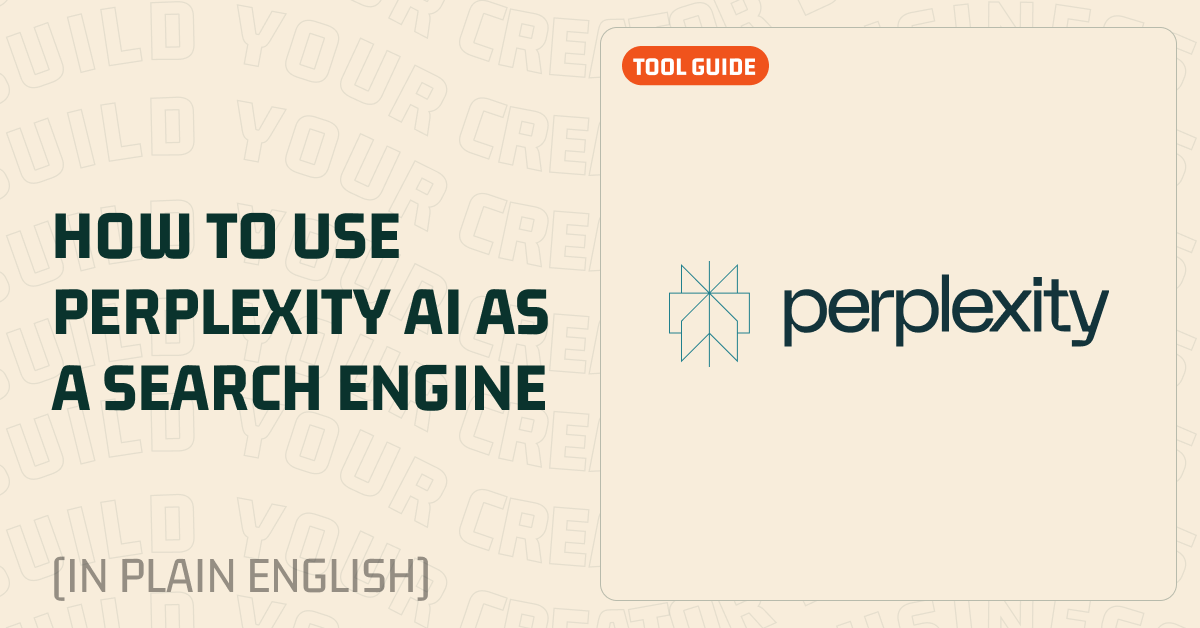What is Perplexity? A Plain English Guide to the AI Search Engine
Learn what Perplexity AI is, how it differs from traditional search engines, and how to use its key features. A complete guide to this powerful AI search tool.

Ever tried to Google something but ended up clicking through endless pages trying to piece together an answer? Or found yourself cross-referencing multiple sources just to fact-check a simple claim? Traditional search engines are great for finding websites, but they often fall short when you need direct answers to specific questions.
That's where Perplexity comes in. It's an AI-powered search engine that gives you clear, direct answers instead of just links to websites. Think of it as having a really knowledgeable research assistant who can instantly read and summarize information from across the internet.
What Makes Perplexity Different?
Unlike traditional search engines, Perplexity combines AI language models with real-time web search to provide direct answers. It uses a combination of large language models (including GPT-4o and Claude 3.5 Sonnet for Pro users) and current web data to generate responses.
Here's what sets it apart:
- Gives direct answers to questions, not just links
- Shows you exactly where information came from
- Updates in real-time with new information
- Lets you ask follow-up questions naturally
- Provides pro and con comparisons for products and services
Key Features and How to Use Them
1. Focus Modes
Perplexity offers different modes depending on what you're looking for:
- Academic: Perfect for research papers and scholarly articles
- Writing: Helps with writing and language questions
- Coding: Specifically for programming and technical queries
- General: For everyday questions and searches
2. Copilot (Pro Features)
This is Perplexity's premium feature that lets you:
- Access to Claude-3.5 Sonnet and GPT-4o
- Use image recognition and generation
- Get faster response times
- Have longer conversations about topics
3. Sources Panel
Every answer shows where the information came from. You can:
- Click to view original sources
- Check how recent the information is
- Verify facts independently
Go to perplexity.ai and try these three searches to get a feel for how it works:
👉 "What were the biggest news stories this week?"
👉 "Compare MacBook Air vs MacBook Pro"
👉 "Explain quantum computing like I'm 5"
4. Mobile Apps
Perplexity offers free mobile apps for iOS and Android devices that provide:
- Voice and text queries
- Cross-device syncing
- Image understanding capabilities
- Library of past searches
- Support for 15+ languages including English, French, German, Spanish, Japanese, and Chinese
The mobile app leverages multiple AI models including:
- Claude-3.5 Sonnet (Pro users)
- GPT-4o (Pro users)
- Sonar Large (Pro users)
- Grok 2 (Pro users)
And for free users, you'll access Perplexity's own home-grown default model, which for me has worked quite well.
They say:
Perplexity’s default model is optimized for quick searches and web browsing, delivering fast, relevant results thanks to fine-tuned adjustments for efficiency. This model is available to both free and Pro users.
Real-World Use Cases
Research
- Finding and comparing academic papers
- Gathering statistics and data
- Fact-checking claims
- Summarizing complex topics
Shopping
- Product comparisons
- Finding best prices
- Reading aggregated reviews
- Understanding technical specifications
Learning
- Getting explanations of complex topics
- Finding study resources
- Learning new skills
- Understanding current events
Work
- Market research
- Competitive analysis
- Technical troubleshooting
- Writing assistance
Pricing and Plans (As of March 2024)
Perplexity offers two main tiers:
Free Plan:
- Basic search capabilities
- Standard response time
- Access to basic models
- Limited daily searches
Pro Plan ($20/month):
- Access to Claude-3 Sonnet and GPT-4 Turbo
- Faster response times
- Image generation and analysis
- Unlimited searches
- File upload and analysis
- Priority support
Alternatives and How They Compare
Note: Features and capabilities of AI search tools are rapidly evolving. The following comparisons are current as of March 2024 but may change.
Google SGE (Search Generative Experience)
- Pros:
- Integrated directly into Google Search
- Free to use
- Powerful image and lens capabilities
- Access to the most comprehensive web index
- Cons:
- Currently in experimental phase
- Limited availability (requires Search Labs opt-in)
- Less conversational than dedicated AI search tools
You.com
- Pros:
- Strong privacy focus (no tracking)
- Multiple AI models to choose from
- Built-in coding assistant
- Free tier available
- Cons:
- Smaller knowledge base than major competitors
- Some advanced features require subscription
- Can be slower than alternatives
Bing + Copilot (formerly Bing Chat)
- Pros:
- Powered by GPT-4 and DALL-E 3
- Free to use
- Strong integration with Microsoft ecosystem
- Image generation included
- Cons:
- Requires Microsoft account
- Limited to Edge browser or Bing app
- Sometimes less reliable for complex queries
Anthropic Claude
- Pros:
- Exceptional accuracy and reasoning
- Strong at technical and academic content
- Advanced coding capabilities
- Longer context window
- Cons:
- Not primarily designed as a search engine
- Requires subscription for full features
- No built-in image generation
- May not access real-time information
Kagi
- Pros:
- Fast, ad-free search experience
- Strong privacy protection
- Custom AI models for specific tasks
- High-quality curated results
- Cons:
- Paid service only
- Smaller user base
- Limited integration with other tools
Scite
- Pros:
- Specialized in academic and scientific research
- Shows citation context and whether papers support or contradict each other
- Over 1 billion citation statements analyzed
- Integrates with Chrome and reference managers
- Cons:
- Focused only on academic content
- Most powerful features require subscription
- Not designed for general search queries
- Learning curve for citation analysis features
Tips for Getting Better Results
- Be Specific
- Bad: "tell me about cars"
- Good: "what are the top-rated electric cars under $40,000 in 2024?"
- Use Follow-ups
- Ask clarifying questions
- Request more details on specific points
- Ask for examples or comparisons
- Check Sources
- Always verify important information
- Look for recent sources
- Cross-reference critical facts
- Use Focus Modes
- Match the mode to your task
- Switch modes if you're not getting good results
Making the Most of Perplexity
Perplexity isn't meant to replace traditional search engines - it's another tool in your toolkit. Use it when you need:
- Quick, direct answers to specific questions
- Help understanding complex topics
- Up-to-date information summarized clearly
- Comparisons and analysis
- Academic or technical research
Remember that while Perplexity is incredibly useful, it's still an AI tool. Always verify important information, especially for critical decisions or academic work.
The best way to understand Perplexity's value is to try it yourself. Start with some simple queries, then gradually explore its more advanced features. You might be surprised at how much time it saves you compared to traditional search engines.
Ready to give it a try? Head over to perplexity.ai and start exploring. And remember - the more specific your questions, the better your results will be.
Privacy and Data Usage
Perplexity collects certain data to provide its services. According to their privacy policy, this includes:
Data Collection
- Search queries and responses
- Usage information
- Device identifiers
- Location data (if enabled)
- Purchase information (for Pro subscribers)
Data Protection
- All queries are processed securely
- Sources are always cited for transparency
- Users can delete their search history
- Pro subscribers get additional privacy features
Best Practices
- Avoid sharing sensitive personal information in queries
- Review sources for sensitive topics
- Use focus modes appropriate to your privacy needs
- Consider the Pro plan for additional privacy features
Real-World Examples
Here are some specific ways users are getting value from Perplexity:
Academic Research
"What are the main criticisms of string theory in modern physics?"
- Gets multiple perspectives from academic sources
- Cites recent papers and expert opinions
- Provides follow-up questions for deeper exploration
Technical Problem-Solving
“Debug this Python error: ImportError: No module named ‘tensorflow’”
- Identifies common causes
- Provides step-by-step solutions
- Shows relevant documentation
Current Events Analysis
“What are the economic impacts of recent Fed interest rate decisions?”
- Pulls from latest news sources
- Compares different expert analyses
- Updates with real-time information
Product Research
“Compare the battery life and camera quality of iPhone 15 Pro vs Pixel 8 Pro”
- Provides detailed specifications
- Includes expert reviews
- Shows real-world performance tests

